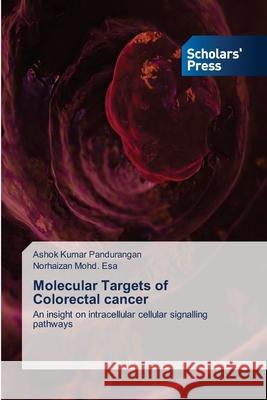Molecular Targets of Colorectal cancer » książka
Molecular Targets of Colorectal cancer
ISBN-13: 9783639719031 / Angielski / Miękka / 2014 / 100 str.
This book describes the crucial molecular targets of colorectal cancer. It is considered as a serious health problem in most developed countries and is the third leading cause of cancer mortality throughout the world. Colorectal cancer affects >1 million people every year and is responsible for >.5 million cancer-related annual deaths. Generally it is a multi-step process involving three distinct stages, initiation that alters the molecular message of a normal cell, followed by promotion and progression that ultimately ends up with a phenotypically altered "transformed cell." The concept of multi-stage carcinogenesis involves the sequential acquisition of cellular mutations followed by expansion of the mutated clone within a population of cells. During the development of cancer there are numerous signalling pathways(PI3K/Akt/mTOR, Wnt/ -catenin, Notch, COX-2, iNOS, Apoptosis, JAK/STAT3)were dysregulated. Developing new, effective and less side effect chemotherapeutic drugs are the challenge for researcher's. So, understanding the molecular alterations during colon cancer will enable to develop more chemotherapeutic drugs for colon cancer."
This book describes the crucial molecular targets of colorectal cancer. It is considered as a serious health problem in most developed countries and is the third leading cause of cancer mortality throughout the world. Colorectal cancer affects >1 million people every year and is responsible for >.5 million cancer-related annual deaths. Generally it is a multi-step process involving three distinct stages, initiation that alters the molecular message of a normal cell, followed by promotion and progression that ultimately ends up with a phenotypically altered "transformed cell". The concept of multi-stage carcinogenesis involves the sequential acquisition of cellular mutations followed by expansion of the mutated clone within a population of cells. During the development of cancer there are numerous signalling pathways(PI3K/Akt/mTOR, Wnt/β-catenin, Notch, COX-2, iNOS, Apoptosis, JAK/STAT3)were dysregulated. Developing new, effective and less side effect chemotherapeutic drugs are the challenge for researchers. So, understanding the molecular alterations during colon cancer will enable to develop more chemotherapeutic drugs for colon cancer.











